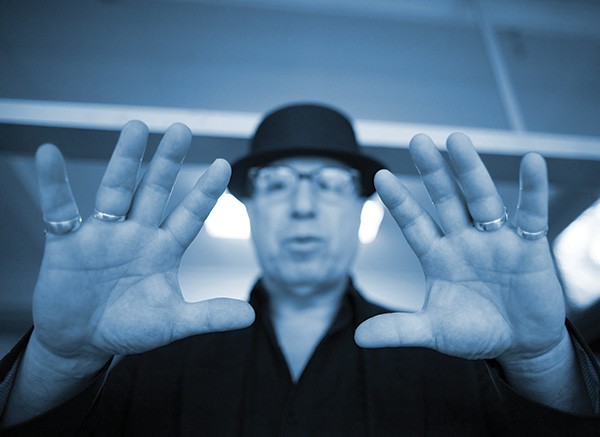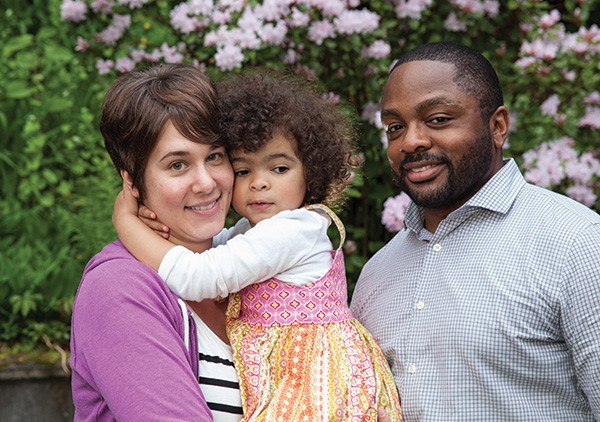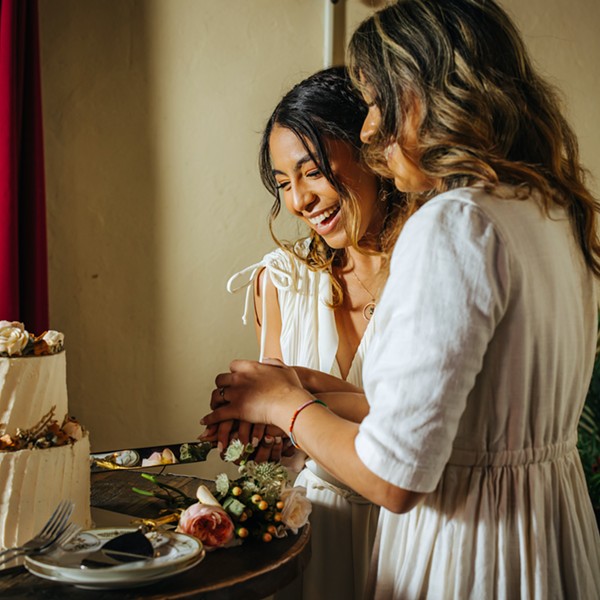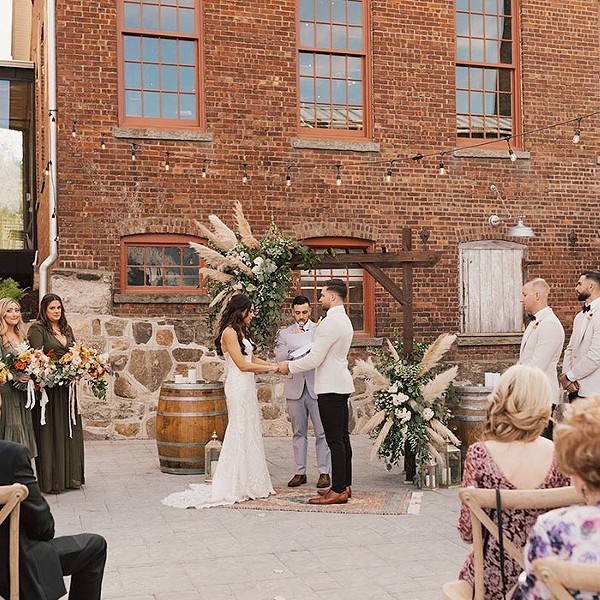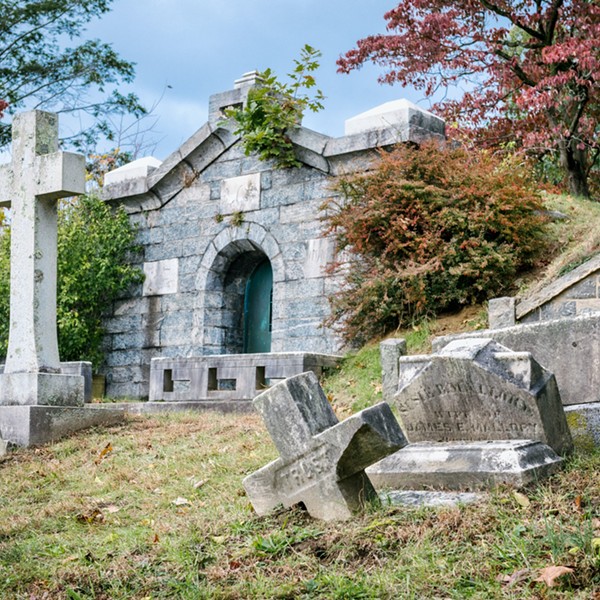Sage Newkirk grew up Presbyterian and "casually went to church here and there." Her husband, Joseph Newkirk, was never a churchgoer. "We're not very religious," Newkirk says.
When the Kingston residents became parents, they knew a traditional baptism or christening would not reflect their own values and beliefs, but they still desired to welcome their son, Garrett (now age 7), and daughter, Mackenzie (now age 2), into the world in a special way. "We wanted a gathering of family and friends to honor our children," Newkirk says. "We had people in mind that we wanted to mark as their godparents, to be deeply involved in their lives."
The Newkirks found Jeanne Stark of Hudson Valley Ceremonies by searching online. Stark, an ordained wedding officiant, also performs baby blessings. "She did a custom ceremony for us right in our living room," Newkirk says.
The parents picked and chose the elements they liked best from a handful of sample ceremonies. Stark also asked them questions about their families. The resulting baby blessings featured godparents, the honoring of grandparents and great-grandparents, the lighting of candles, and anointing the babies with water—elements of a more traditional religious ceremony performed in a secular way.
Like the Newkirks, a growing number of parents—who are religiously unaffiliated or have a blended cultural/religious household—might shy away from a more traditional baptism (Christian) or bris (Jewish circumcision ceremony for eight-day-old boys), but still want to commemorate their children's birth before a group of family and friends. They are turning to nondenominational officiants for baby blessings, naming ceremonies, spiritual welcoming ceremonies, and baby dedication ceremonies.
"Having children makes people care more about deep issues," says Christopher White, associate professor of Religion in America at Vassar College. "It's a sacred, profound, powerful thing, whatever you call yourself religiously." If there is an uptick in such celebrations, they can be linked in part to the increase of Americans who describe themselves as spiritual rather than religious, White says. "It's the rise of the so-called religious 'Nones'—those that say, 'I am not a member of any religious community,'" he says. "What those people believe is another story."
One-fifth of the US public—and a third of adults under 30—are religiously unaffiliated today. However, a 2012 survey by the Pew Research Center's Religion & Public Life Project, conducted jointly with PBS's "Religion & Ethics NewsWeekly," found that many of the country's 46 million unaffiliated adults still connect to the religious or spiritual in some way.
Two-thirds of the Nones said they believe in God (68 percent). More than half said they often feel a deep connection with nature and the earth (58 percent), while more than a third classified themselves as "spiritual" but not "religious" (37 percent). One in five (21 percent) religiously unaffiliated adults said they pray every day.
Christopher and Jessica Griswold, who are among the unaffiliated describing themselves as "more spiritual than religious," wanted to celebrate the sacredness of the birth of their son, Jaxon. "It kind of felt empty without having some kind of ceremony that marked his coming into the world," says Jessica Griswold, who received Roman Catholic sacraments during childhood and adolescence. Her desire for a ceremony is not surprising, says White. "When you have kids you fall into patterns that you experienced when you were a kid," he says.
Christopher Griswold was skeptical when Jessica brought up the idea of a christening for Jaxon. "I said, 'You know we're not typical traditional people,'" he recalls. The couple turned to the Right Rev. Stuart B. Chernoff, also known as musician Studio Stu, to lead a nondenominational baby blessing ceremony instead. Chernoff is an ordained spiritual humanist cleric who officiated at the couple's wedding ceremony in Harriman State Park. "It's not that I don't believe in something, some sort of spiritual presence," Jessica says. "I just don't believe in a different god for every religion, or in a lot of the rules that come with churches."
The new parents were thrilled when Chernoff agreed to drive to their home in Centereach, Long Island, so they could have Jaxon's blessing in their backyard. "I create a ceremony based on the parents' beliefs," Chernoff says. "I don't think anyone should say something they don't believe in."
The officiant, who describes many of his clients as "more of the earth," says his ceremonies are often inspired by Celtic and pagan practices. "But it doesn't matter if somebody wants a more Christian or Jewish ceremony or an earthbound thing—I really gear it toward the individual."
Most traditional baptisms involve water, which many of Chernoff's clients request, he says. "So we often use the element of water—touch the hands, touch the heart, touch the feet," he says. "And there's specific invocations for each of those."
Like Chernoff's ceremonies, water is commonly used in baby blessings officiated by Rhianna Mirabello, owner of Dreaming Goddess in Poughkeepsie. "Water is cleansing and healing, although I don't ascribe to the 'cleansing of original sin piece,'" Mirabello says, noting the Christian rationale for baptism. "To bless and anoint with water is a powerful thing."
One family used Hudson River water in their baby's ceremony. "I discussed the qualities of the river—that it flows both ways—and I recited the Native American name for the river, Mahicantuck," Mirabello says.
A common thread among the "really personal" ceremonies at which she officiates is the desire of parents to include family and friends in the bestowing of prayers and blessings over the honoree, Mirabello says. "It's that idea of children entering into their tribe," she says. One ceremony focused on the stone jade to honor the name of the baby being blessed. Family members passed around a jade necklace and said prayers into the stone for Baby Jade. The necklace was gifted to her to be worn when she got older.
The milestones of marriage, having children, and becoming part of a community—typically reached by the mid-40s—historically meant an increase in religious identification. "It's kind of the old conventional wisdom that people become more religious as they get older," White says.
But according to a 2012 Trinity College study, the percentage of Generation X-ers who are self-proclaimed religious Nones increased from 11 percent to 16 percent between 1990 and 2008, an apparent shift away from the conventional.
Kingston resident Ann Marie Woolsey-Johnson and her husband, Lionel Johnson, describe themselves as agnostic. "We try to honor the spiritual," Woolsey-Johnson wrote in an e-mail interview. The couple decided to have a blessing for their daughter, Sabine. "It was part superstition, part wanting to honor and acknowledge this wonderful new little addition to our family," wrote Woolsey-Johnson, who was baptized a Roman Catholic.
Sabine was surrounded by family and some friends for the unscripted ceremony led by Lionel's aunt, an African Methodist Episcopal minister.
"She gave Sabine a very informal blessing on her first birthday," Woolsey-Johnson wrote. Many X-ers are the first generation to identify as religiously unaffiliated, which can make for some delicate conversations with more traditional, older family members. "My maternal grandparents had some issues with us not having a Catholic church ceremony," Woolsey-Johnson wrote.
An increase in marriages between spouses of a different race or ethnicity from one another may also contribute to couples' decisions to celebrate a new child differently from their parents or grandparents, says White, the Vassar professor. About 15 percent of all new nuptials in the United States in 2010 were intermarriages, more than double the share in 1980, according to a 2012 report from the Social & Demographic Trends project of the Pew Research Center.
The numbers of interfaith couples in America have also increased, White says, and as new parents they might choose to borrow from another culture's traditions as a way to keep things neutral.
The Korean Baek-il (100th-day celebration), for example, includes prayers of thanks, wealth, longevity, and luck for the child as well as the sharing of red bean rice cakes by 100 family, friends, and neighbors.
"The wife was raised in a Jewish context, the husband was raised Catholic, they're both secular, what are they going to do?" White says hypothetically. "Hey, let's try this Korean ceremony."
The rise of "Nones" coincides with the rise of "spiritual shoppers," he says. "You also see people mixing and matching a lot—'I'm really interested in Buddhist meditation; I do yoga once a week.'"
White, who is a member of the Bahá'í faith, was named godfather of the child of his friends, who are Catholic. "The godparent traditionally is in charge of the religious upbringing of the child. I'm not even Catholic," he says. Religious or not, having children evokes powerful feelings. "The inherent sacred quality of that—people want to mark that," White says.
RESOURCES
The Right Rev. Stuart B. Chernoff: Revstuart.com
Hudson Valley Ceremonies: Hudsonvalleyceremonies.com
Dreaming Goddess: Dreaminggoddess.com







